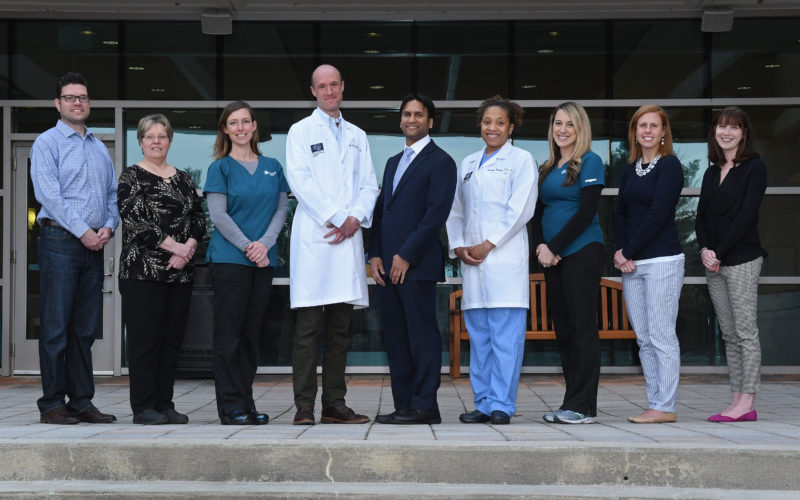Neurosurgeons perform first awake brain surgery in Delaware
Procedure allows special sensitivity to speech and communication

In a procedure performed in Delaware for the first time, Christiana Care neurosurgeons Pulak Ray, M.D., and Leif-Erik Bohman, M.D., conducted brain surgery while their patient was awake and talking with them.
The procedure, called an awake craniotomy, has a long history of use for different conditions, but was performed for the first time in the state to treat a brain tumor.
Awake brain surgery was essential in this case because the patient’s tumor, called a glioblastoma multiforme, was pushing on centers that control speech and language comprehension, causing problems with speech. Surgeons needed the patient awake and communicating to guide them physiologically in order to protect and preserve those critical functions.
“Our ability to perform awake craniotomies at Christiana Care makes it possible to treat brain tumors in sensitive regions where surgery may not have been possible previously,” Dr. Ray said. “Awake brain surgery can allow better outcomes and less damage to healthy brain tissue.”
Christiana Care is a national leader in cranial neurosurgery, as recognized by Healthgrades with an Excellence Award annually since 2016.
A team approach
Among the multidisciplinary team of experts involved in the procedure were speech pathologists, intraoperative neuromonitoring specialists, specialized neurosurgical nurses and anesthesiologists under the guidance of Christiana Care anesthesiologist Sophia Cisler, M.D.
“For an awake patient to feel comfortable in the operating room environment, we also must incorporate very careful and strategic sedation medication,” Dr. Cisler explained. “This is particularly important in a craniotomy procedure, where close control of the patient’s breathing, blood pressure and heart rate are essential for safety.”
Recent advances in intraoperative brain-mapping technology and the evolution of more sophisticated anesthetics have opened new possibilities for treating infiltrating brain tumors like glioblastomas that are difficult to remove.
Using advanced imaging guided navigation, the team created a detailed map of the patient’s brain and confirmed the functional location of speech centers using a technique called direct cortical mapping, where electrical discharges are systematically delivered to the tumor bed and surrounding brain tissue.
Preserving speech
During this process, Christiana Care speech pathologists Jessica Bahls, MS CCC-SLP, and Kristen Palmer, MA, CCC-SLP, BCS-S, kept the patient talking and alerted the team to any difficulties or lapses in speech that might signal a no-go zone.
“Using direct cortical mapping, we were able to identify safe corridors within the temporal lobe to approach the tumor and to delineate precisely where we could remove tumor tissue without damaging critical functions,” Dr. Bohman explained.
After reviewing the medical literature, Palmer and Bahls developed a patient-specific speech pathology protocol for the awake craniotomy.
“We carefully considered the patient’s baseline level of functioning as well as anticipated areas of speech difficulty based on the location of the brain tumor,” Palmer said. “Our biggest challenge was to anticipate how we might need to refine or customize the speech and language tasks needed as the procedure progressed.”
While the operation progressed, they continued to assess the patient’s ability to perform automatic speech tasks such as counting numbers or reciting the days of week, to follow directions, or to use expressive language to describe a picture or list items in a category. All the while, the surgeons were removing the tumor, guided by the information provided by navigation as well as the patient’s speech, to decide which areas they could safely remove without endangering the ability to talk.
“This was indeed a team effort and one that speaks to our nationally recognized model of multidisciplinary cancer care,” said Nicholas Petrelli, M.D., Bank of America endowed medical director of the Helen F. Graham Cancer Center & Research Institute. “The ability to offer advanced neurosurgical procedures such as awake craniotomy is one more reason why our patients can expect leading cancer treatment right here in Delaware.”